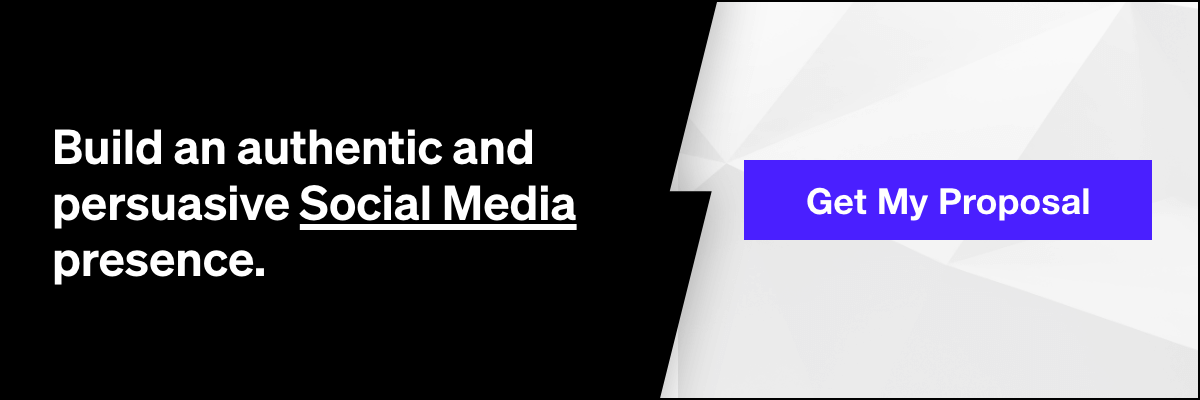Google Ads vs. Facebook Ads: Which is Best for You?

In a world driven by digital and social advertising, Google and Facebook have to be at the forefront of your mind and marketing strategy efforts. 96% of brands are spending money on Google Ads,1 and ten million advertisers are using Facebook, up from three million just five short years ago.2 Clearly, both are valuable, but which is best?
We’ve already honed in on the most important question: which social advertisement is best for you?
The most effective advertising platform for your business will depend on a number of internal and external factors. There is a right answer for each company—let’s dive in so you can find what it is for yours.
The Major Difference: General vs. Specific Search Intent
If most internet users are active on both social media and search engines, then why does it matter where you put your focus? You’re reaching all the same people anyway!
The monthly active users may overlap, but their reasons for using Google and Facebook, respectively, are quite different. Before we touch on the major considerations that will inevitably inform your decision, you have to understand the fundamental difference between google ads vs facebook ads:
- Facebook ad builds awareness – People don’t use Facebook to shop. When they scroll (often mindlessly) through their News Feed, they’re not looking for anything specific. However, occasional ads pop up that happen to align with their interests. They may click to see more or just file it away for later. Unless you’ve magically targeted your ad to someone who is looking for your exact product—a pair of shoes, let’s say—then your FB ad won’t result in a direct conversion. But the right users will remember that they liked your shoes when it comes time to shop for new footwear next season.
- Google ads answer specific queries – People use search engines to find answers to their questions or products to meet their needs. Oftentimes, they specifically intend to buy something. They already know what they want, and now they’re hoping the right product—your product—shows up on their search results page. The same person who loved your shoe designs but didn’t need a new pair will now be searching for the very thing they became aware of on Facebook.
There are many ways to look at this—Facebook is a casual window shopper while Google is the person who goes to the mall with an itemized list in hand; Facebook is the top of the funnel and Google is the middle to end; Facebook casts the rod and Google reels it in.
With that in mind, let’s cover some of the most common considerations that factor into the ultimate debate: Google ads vs Facebook ads.
#1 What Stage In The Buying Journey
As we’ve just discussed, Facebook is great for building early brand awareness and loyalty, while Google is perfect for late-stage customers with a high level of intent. But that doesn’t help much in determining which to use—most companies need both to thrive.
Deciding between the two comes down to timing.
Case in point: Pretend you’re marketing income tax preparation software. Throughout the year, you rely heavily on Facebook advertising to get your brand in front of people. They start to recognize the name and they’re familiar with your services. As tax season approaches, you switch your digital strategy by leaning into Google ads as users start actively searching out tax preparers.
Advertising on Google would be more or less useless in, let’s say, September. But from January to April, it would be the best use of your advertising budget and efforts.
#2 The Product or Service’s Current Search Volume
If we oversimplify the commercial landscape, we can envision two broad categories of products and services:
- Those that address a common pain point or provide much-needed services and products that people actively seek out. These include tax preparers, for one, but also clothing, houseware, video games, and anything that exists within a predefined category.
- Those that solve a problem people don’t yet realize they have or in a way consumers didn’t realize was possible. These groundbreaking inventions create new industries or shatter the paradigm around existing ones, like new apps and technologies.
To keep things simple, brands that are more aligned with the former will benefit from Google ads. People are already searching for their product or service, which allows them to effectively capitalize on public interest. But without an existing search volume, Google advertising won’t yield many conversions, either.
Case in point: When companies like Uber, Netflix, and Tile first started out, there was little to no search volume for the terms “ridesharing app,” “streaming platform,” and “Bluetooth tracker.” There was no buyer intent for those companies to meet.
In these cases, there are two possible courses of action:
- Build brand awareness through Facebook advertising until you’ve developed a reasonable search volume. From there, you’ll be better positioned to venture into a Google ad campaign.
- Adjust the way you define and refer to your services as you target Google ads towards the pain points you solve. Imagine you’re marketing for Uber just as they’re getting started. You’d want to replace the accurate descriptor—“ridesharing”—with the keywords people actually search for—“taxi,” “airport shuttle,” “local transportation”—to meet the queries of those who need an app like Uber but just don’t know about it yet.
#3 Its Relevance to Life Events
Some products and services are “evergreen.” They could come into play at virtually any stage of your life, including popular industries like clothing, food, hygiene products, and entertainment. Seeing as so many of these evergreen products are essentials, people are always looking for them.
Enter a Google ad campaign.
But if you’re in an industry that often correlates to specific life events or demographics, Facebook’s ad targeting is unparalleled. You can create entire customer personas around hyper-detailed characteristics, including:
- Location
- Age, gender, and ethnicity
- Languages spoken
- Relationship status and interests
- Education level
- Work-life, including employer, job title, industry, and office size
- Home type, ownership, and household composition
- Parenthood status, broken into categories based on the child’s age
- Miscellaneous life events like an upcoming anniversary, relocation, or vacation
- Interests, including entertainment, hobbies, sports, fashion, and more
- Behaviors, ranging from vehicle ownership to finances to mobile device usage to purchasing habits
- Previous connections to your business’ page
Now that is some seriously powerful ad targeting. Facebook advertising opens up a whole world of targeting capabilities, which is especially valuable for companies that appeal to limited demographics, certain life stages, or niche combinations.
Case in point: There are plenty of products that almost always correspond with some kind of life event. With Facebook advertising, you can market to people who don’t yet know how badly they need your products or services.
For example:
- The bride-to-be is stressed to the max. That’s when she notices an ad for a wedding planning company or an app that tracks every aspect of her big day.
- The recent college graduate that’s been unemployed for a year would be a great target for job preparation resources or business skills training.
- While every new parent needs diapers, the family that eats vegan and buys organic will likely be thrilled to see natural, non-toxic, biodegradable diapers on their News Feed.
Facebook lets you target those niche markets. With Google, on the other hand, you’d have to wait until those people came looking for you. And if they’re not, that means Google probably isn’t your best advertising campaign option right now.
Arriving At A Verdict: FB Ads vs. Google Ads?
By now, you should have an idea of how your brand will fit into either one or both of these valuable digital marketing tools. In case you’re still on the fence, we’ll run through a general overview of which is best for you, based on everything we’ve covered and more.
Lean into how to run Facebook ads if:
- You’re looking to build brand awareness. This applies if your product or service offering doesn’t yet have a large search volume, is in its early stages of development, or is in its “off-season.”
- You’re trying to target demographics or life events. This works especially well for products that people totally benefit from but don’t often seek or think about. You give them what they want before they know it themselves.
- Your brand relies on visuals or more detailed explanations. Facebook uses high-quality media in its advertisements, including pictures, videos, carousels, and more. Google is often limited to just words or images of products without contextualizing information.
- You have a limited budget. In advertising, money talks. Or, more accurately, money is needed to talk, especially in industries that have high cost-per-click prices on Google Ads. Your budget will go further on Facebook than on Google.
Opt for Google ads if you’re selling products or services people actively seek out. This includes products with a high search volume or that are always on people’s shopping lists. If users have intent to buy the products you sell, they’re much more likely to buy them through Google—a search engine specifically made for finding what you need.
Realistically, most companies benefit from a combination of both, usually geared towards different stages of their sales funnel. But knowing when and how to use each one will help you get the most out of both platforms.
Optimizing Google & Facebook Advertising
With these two advertising platforms at your disposal, there’s a lot you can accomplish. But your advertising efforts won’t pick up much momentum if you don’t know how to get the ball rolling. The first steps of the optimization process include:
- Developing a strategy that encompasses both platforms
- Defining customer personas based on data-driven research into your consumer base
- Identifying target audiences on Facebook and target keywords on Google
- Conceptualizing and creating the high-quality ads that earn you clicks and conversions
- Analyzing website traffic, ad performance, and search results to optimize your strategy
Facebook versus Google? Why not both? After all, two is better than one, and a professional team of digital marketers is better than guessing games and hoping for the best. Here at Power, we’re attuned to both your paid social and pay-per-click advertising needs. Need help with facebook ad specs or facebook retargeting ads? We’ve got you covered.
With all this and more, you’ll experience the full power of digital marketing.
Sources:
- PPC Protect. PPC Statistics You Need to Know in 2021. https://ppcprotect.com/ppc-statistics/
- Statista. Number of active advertisers on Facebook from 1st quarter 2016 to 3rd quarter 2020. https://www.statista.com/statistics/778191/active-facebook-advertisers/
Our Editorial Standards
Reviewed for Accuracy
Every piece is fact-checked for precision.
Up-to-Date Research
We reflect the latest trends and insights.
Credible References
Backed by trusted industry sources.
Actionable & Insight-Driven
Strategic takeaways for real results.











